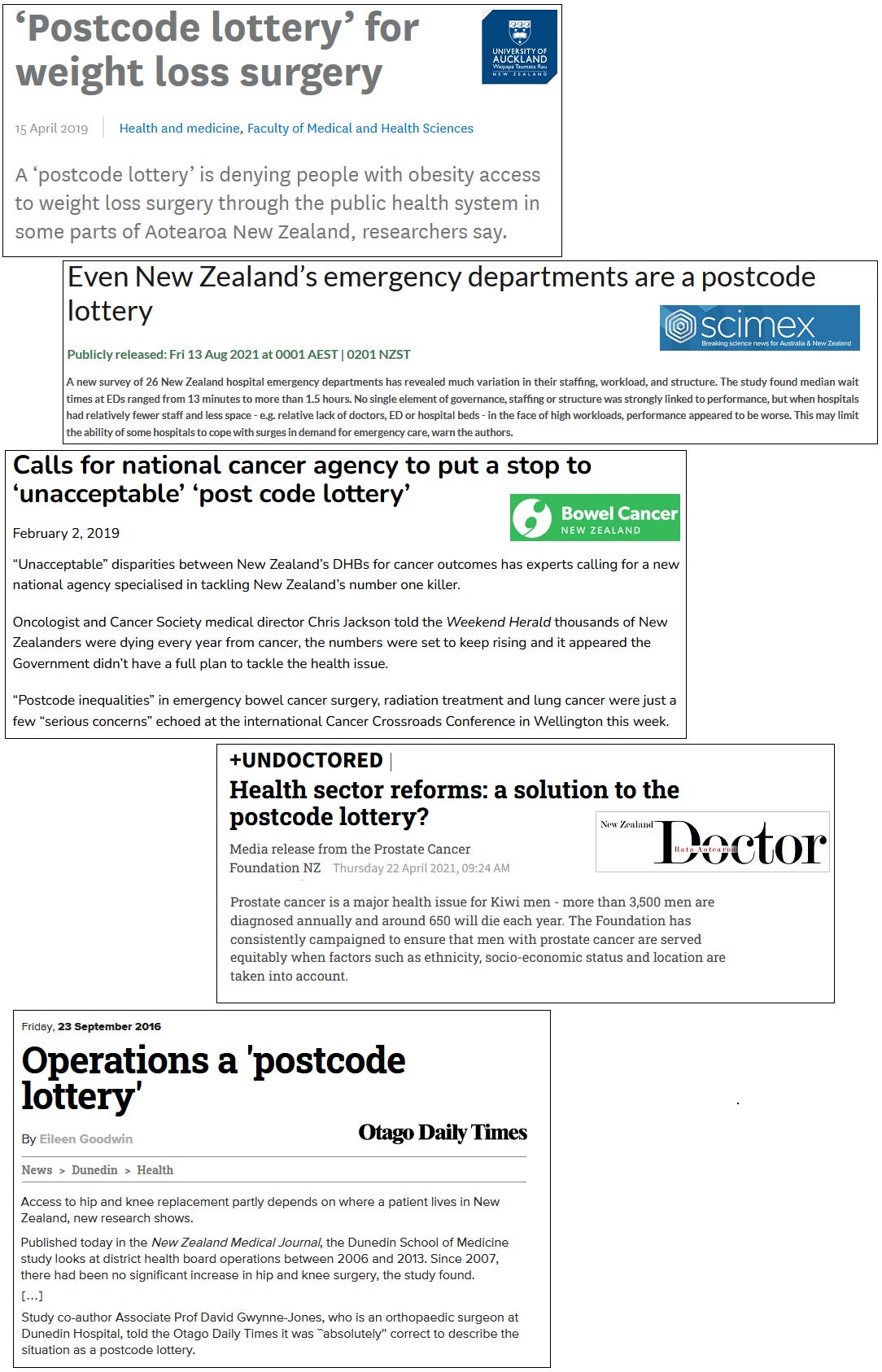There are currently twenty DHB's servicing Aotearoa - a country with five million people. A population that would fit comfortably in eightyone cities around the world.
The fragmented system has twenty CEOs; twenty Boards (with up to eleven members each); twenty IT systems (to be confirmed); twenty HR departments; twenty payroll systems (to be confirmed); twenty of everything.
The system has been described on more than one occasion as a "postcode lottery" for delivering health outcomes to New Zealanders:
The last item, from the Otago Daily Times, is dated 23 September 2016. Which means that the "postcode lottery" system for delivering haphazard healthcare was happening under National's watch. As usual, they did nothing for nine years.
On 21 April 2021, Health Minister Andrew Little announced the scrapping of all twenty DHB bureaucracies, to be replaced by one new organisation:
All 20 district health boards replaced with a new Crown entity, Health New Zealand, which will be responsible for running hospitals and commissioning primary and community health services. It will have four regional divisions.
Responsibility for public health issues will rest with a new Public Health Authority, and a new Māori Health Authority will monitor the state of Māori health and have the ability to commission services directly.
Minister Little explained the glaringly obvious benefit to scrapping twenty DHBs and replacing with one organisation:
"The reforms will mean that for the first time, we will have a truly national health system, and the kind of treatment people get will no longer be determined by where they live.
The reforms will also ensure the system is able to cope with the effects of an ageing population and respond more quickly to public health crises like the COVID-19 pandemic."
As Luke Malpass, writing for Stuff, pointed out with crystal clarity:
If Covid showed anything it was that the dispersed and fragmented nature of health Government wasn’t fit for purpose. DHB deficits are endemic and some DHBs are very poorly-run. Prior to last year’s lockdown Stuff asked each DHB how many ventilators each had. Many couldn’t answer.
Bizarrely, National's Christopher Luxon has stated his party's total opposition to the reforms. His rationale? That it would somehow "create more bureaucracy":
"My view is creating a Health NZ mega authority and mega bureaucracy for a Government that's already added 14,000 more bureaucrats at $2 billion and yet we haven't got better health.
We're going to spend half a billion dollars with management consultants."
How this would "create more bureaucracy" remains unclear and is yet to be explained to us.
But where bureaucracy is concerned, National has "form".
In December 2008, former Prime Minister-to-be John Key promised that, if elected, his government would reduce bureaucracy:
"My Government intends to embrace New Zealand's clear opportunities for improved economic performance and to use them to deliver better wages and living conditions for all New Zealanders.
It commits to, amongst other steps, an ongoing programme of personal tax reductions; a step-up in infrastructure investment; a reduction in government bureaucracy...
[...]
... My Government intends to reduce surgery waiting lists, to cut wasteful bureaucracy, and to address the health workforce crisis."
Instead, New Zealanders got bloated consultants fees, costing taxpayers well over a billion dollars and cuts to health services;
When challenged, former Finance Minister Bill English clutched at straws to explain National's spending blow-out on consultants:
"We just don't have public servants sitting around who know, for instance, how to redo immigration's global information system because it's got offices all over the world. We don't have public servants sitting around who know how to redo the 25-year-old tax collection system."
Perhaps Mr English would have had "public servants sitting around who know how to redo the 25-year-old tax collection system" - had his government not sacked thousands of experienced staff from the state sector:
Almost 3000 jobs have been slashed since National took office in 2008 as the government looks to cut $1 billion worth of spending.
Never mind the mind-boggling billion-dollar price tag for consultants - the loss of institutional knowledge would have been irreparable.
So much for Mr Luxon complaining bitterly that the proposed reforms would cost "half a billion dollars with management consultants".
And yet...
National is not averse to creating or expanding bureaucracies.
In 1978, the then-Muldoon administration merged NAC and Air New Zealand into the present day organisation. The merger was not popular, and despite opposition, went ahead.
In 2010, the then-Key administration over-saw the merger of eight separate local bodies into the new Auckland Council "super city". The merger was carried through by National's junior coalition partner, ACT, with Rodney Hyde as then-Local Government Minister. The cost of amalgamation? $300 million - and that was just for a new IT system to cope with an enlarged authority/bureaucracy.
Mr Hyde blamed soaring costs on left-wing politicians.
In 2012, the then-Key administration amalgamated Department of Building and Housing, the Department of Labour, the Ministry of Economic Development, and the Ministry of Science and Innovation into what was termed a new "super ministry", the Ministry of Business, Innovation and Employment (MoBIE/MBIE).
The new "super ministry" was so super-efficient that it reported to no less than fourteen Ministers of the Crown.
A State Services Commission report two years later found that the Ministry was not operating well, with "significant and external problems":
"MBIE rated weak on leadership and governance; workforce development; improving efficiency and effectiveness, and financial and risk management...
[...]
... MBIE's senior leadership team struggled to focus on core tasks, and found itself continually bogged down in trivial matters and lacked collective vision"
Proponant of the merger, then Economic Development Minister Steven Joyce, promised that the costs of merger would be low:
"...the only costs involved in the creation of the super ministry were $5000 for the signage on the building."
Real costs that we know about involved $560,000 for MBIE's new website; $67,000 for new signage for its Stout Street office; and $140,000 on a giant curved screen in its reception area. National's business friends were far from happy.
There is a sneaking suspicion that National is not concerned that the health reforms will fail.They would be delighted if it fell flat.
Rather, they are fearful it will succeed and paint Labour as the government of good management. It would show Labour as achieving what National's own bureaucracy-building failed to achieve during their three terms in office.
It is supremely ironic that this government wants to replace twenty different DHBs with one, single, health authority - and National complains it is "creating more bureaucracy".
In the Real World, it's usually the other way around.
.
.
References
Ministry of Health: District health boards
Wikipedia: List of largest cities
University of Auckland: ‘Postcode lottery’ for weight loss surgery
Scimex: Even New Zealand’s emergency departments are a postcode lottery
Bowel Cancer NZ: Calls for national cancer agency to put a stop to ‘unacceptable’ ‘post code lottery’
NZDoctor: Health sector reforms: a solution to the postcode lottery?
Otago Daily Times: Operations a 'postcode lottery'
Beehive: Major reforms will make healthcare accessible for all NZers
Stuff media: The public health overhaul that had to happen
Newshub: Christopher Luxon claims new Health NZ structure will have no benefit
NZ Herald: John Key's Speech from the Throne
NZ Herald: Health cuts loom as Govt refocuses spending
NZ Herald: Spending on consultants rises under National
NZ Herald: Govt depts clock up $1bn in consultant fees
Stuff media: Consultants cost govt agencies hundreds of millions
Stuff media: 555 jobs gone from public sector
Wikipedia: New Zealand National Airways Corporation
Te Ara - Encyclopedia of New Zealand: Changing times - 1960s and 1970s - The end of NAC
Wikipedia: Auckland Council
NZ Herald: Council's IT tangle a $300m headache
NZ Herald: Project Auckland - A super achievement
Beehive: MBIE to proceed from 1 July
Wikipedia: Ministry of Business, Innovation and Employment - Ministers
RNZ: Super-ministry problems 'inevitable'
NZ Herald: Govt defends 'super ministry' merge of agencies
Stuff media: Business 'super-ministry' MBIE spends $560,000 on website overhaul
Landlords association: Joyce defends ‘more efficient' Super Ministry
Twitter: @kloppenmum - line by line luxon - 25.4.22
Other Blogs
Pundit: A Strong Start - But Can Luxon Last?
The Jackal: National flounders over Three Waters reforms
The Jackal: Luxon keeps contradicting himself
The Kaka: Dawn chorus - Luxon incoherent on transport
The Standard: According to National budget slashing is a man’s job
The Standard: Luxon’s strange Public Transport take
Werewolf: Gordon Campbell on gendered perceptions in politics
Previous related blogposts
Corporate Welfare under National
Chris Luxon threatens New Zealanders with The Big Fiscal Stick
.
Acknowledgement: Emma Cook
.
Liked what you read? Feel free to share.
Have your own thoughts? Leave a comment. (Trolls need not bother.)








Great analysis Frank. It is ironic that the Nats are struggling to agree that one health authority will severely reduce the costs currently of 20 DHBs. It was a lovely Nat idea to run the DHBs as a business. Didn't really work out like that. There may have been many unnecessary deaths in NZ because of this misguided approach.